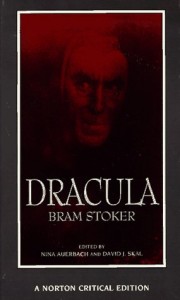August 16, 2012 by Erin
Allusion
 Last week, I read Bram Stoker’s Dracula for an online class I’m taking with my friends Cory and Dustin (also known as “Dut” for reasons yet unknown to me). I tried to read it a couple summers ago, but I got so scared I could only read outside, in broad daylight, and finally I gave up all together. (I think I picked up The Shack instead … not my finest literary moment.) This time, though, I pushed through, even though I nearly bit my nails off. I mean, what would I tell Cory and Dut if I didn’t finish? They are boys, you know, and I didn’t want to come off like a frightened little girl.
Last week, I read Bram Stoker’s Dracula for an online class I’m taking with my friends Cory and Dustin (also known as “Dut” for reasons yet unknown to me). I tried to read it a couple summers ago, but I got so scared I could only read outside, in broad daylight, and finally I gave up all together. (I think I picked up The Shack instead … not my finest literary moment.) This time, though, I pushed through, even though I nearly bit my nails off. I mean, what would I tell Cory and Dut if I didn’t finish? They are boys, you know, and I didn’t want to come off like a frightened little girl.
Well, scared as I was, I couldn’t help being blown away by what a brilliant novelist Stoker was — quite literally a master of subtlety and atmosphere. My favorite part, though, was his use of sacramental imagery. (Go with me on this, because this post isn’t really about Dracula, anyway.) Even if you haven’t read the book, you may know that one of the best weapons against a vampire is a crucifix. Pieces of communion wafer are pretty effective, too. So I started thinking, the characters in the novel are in a very spiritual battle, but they’re fighting with physical objects. In a dark way, Stoker gives us a world in which the spiritual and the material are totally inseparable.
We tend to act as if the physical world has nothing to do with spiritual reality, but that’s just not the case. Stoker was right — the two are completely intertwined. You don’t hear much about sacraments in Protestant circles, but here’s the basic idea: a sacrament is a material object or a physical action that actually acts as a conduit for grace. How beautiful is that? I think God likes matter; He created it, after all. He gave us bodies and set in motion the physical rhythms of our lives. And He didn’t just do it because He had to. When He created, He had the very best in mind. And He set it up so that everything in the world points back to Him, tells us something about Him. As Hopkins said, “The world is charged with the grandeur of God.”
So it’s not so easy to separate what’s “spiritual” and what’s not in our lives. Eating, sleeping, laughing, working — these are just as sacred as praying. Now, I do know that we’re fallen and the world is broken. But I also know that redemption is at work for more than the human soul. Creation itself is being restored, and, mystery of mysteries, God uses the nuances of our lives to draw us closer to Him.
This means a couple of things for me. First, if I say Jesus has my life, it means He has all of it. My body, my intellectual life, my conversations — if He’s not transforming all of it, I’m not really following Him. Secondly, and I love this, I am free from seeing my activities or my career in a spiritual/non-spiritual hierarchy. “Churchy” things aren’t more important than everyday things.
And it means God can show up anywhere and speak through anything — in a good meal or a job well done or even a Gothic novel. See, maybe this was about Dracula after all.

Cory - August 16, 2012 @ 8:58 am
Yeah, Dut and I would have shamed you relentlessly, it’s true.
But, really: what a great post. I too love being able to avoid hierarchies in my daily activities; “churchy” things are not necessarily more important, proved excellently by how God spoke to you through a classic Gothic novel.
Dut - August 16, 2012 @ 1:08 pm
A fantastic post, Erin, and a great moral to take away from Dracula. I especially like the Hopkins reference; he’s great.
Erin - August 16, 2012 @ 1:10 pm
I’m not sure if that moral is really in Dracula or not, but it got me thinking that way, anyway :-) And, don’t get me started on Hopkins. LOVE him.
Kelcie - August 16, 2012 @ 9:51 pm
I couldn’t agree more. I mean, it’s all his, right? If anything is significant, then everything is significant.
Erin - August 16, 2012 @ 11:24 pm
Go ahead.